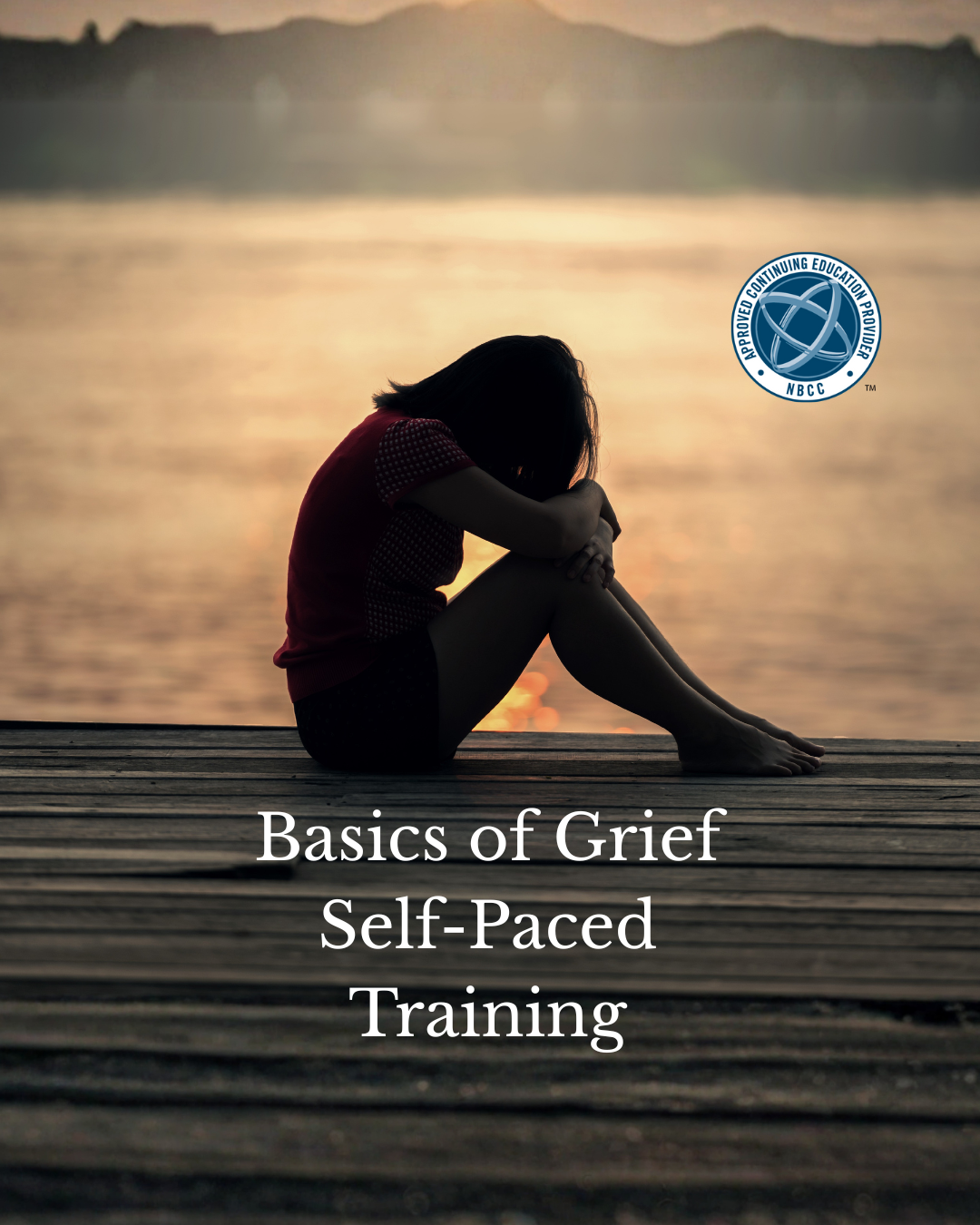
Grief enters our offices every day.
As human beings we cover up grief for various reasons, ranging from what we’ve learned from our own authorities and cultural expectations to personal coping mechanisms.
Our own grief and the way loss has impacted us will affect how we recognize and address the grief our clients bring with them.
Grief is hidden underneath the presenting problems our clients come to us for help.
Are you ready to see the grief and learn how to support your clients in a new way?
Supporting the Supporters: Grief-informed Approaches for Clinicians
Private Practice Grief offers a wide range of support for mental health professionals, including specialized trainings, expert-led consultations, practical resources, and more—all focused on deepening your understanding of grief, loss, and mourning in clinical practice.
🌟 New Offerings!
The Basics of Grief is a 4-hour, evidence-informed training for therapists—live via Zoom on Saturday, January 31 or via a self-paced option for those who cannot attend—designed to build real grief competence and includes 4 CE credits with certificate of completion. Learn more.
Estrangement Grief Course supports therapists in navigating estrangement-related loss with greater clarity and confidence through a self-paced format and includes 3 CE hours. Enroll now and start anytime!
Basics of Grief Live & Self-Paced Course
Cost: $149 early bird pricing (Increases to $175 Feb 1)
Live training: January 31st at 8am-12pm PST via Zoom
Self-paced training: Sent out February 1st
CE Hours: 4
Participants will learn to:
Identify different forms of grief and loss across clinical presentations
Understand contemporary grief frameworks beyond stages and timelines
Support grief without pressure toward closure, resolution, or meaning-making
Work skillfully with unfinished business, continuing bonds, and ambiguous loss
Develop language and presence for sitting with regret, anger, longing, and love
Through case examples and practical, grief-informed strategies, therapists will strengthen their ability to accompany clients through loss with clarity, confidence, and ethical care.
Estrangement Grief Self-Paced Course:
Tools for Processing Unfinished Conversations & Finding Inner Stability
Cost: $85
CE Hours: 3
Family estrangement is increasingly common and often leaves clients struggling with ambiguous grief, emotional wounds, and unresolved relational issues. This self-paced training equips therapists with practical tools to support clients dealing with estrangement due to conflict, betrayal, generational trauma, or cultural shifts.
Participants will learn to:
Recognize forms and stages of estrangement
Help clients process grief without the pressure to reconcile
Address ambiguous loss with clarity and compassion
Use narrative tools and timeline mapping to explore unresolved emotions
Through real-life case studies and hands-on strategies, therapists will gain skills to support clients in expressing regrets, resentments, and gratitude—fostering emotional clarity and healing.
What is Grief?
Grief follows closely behind the client who comes in with panic attacks.
It is not unusual for people who have had significant loss to experience panic attacks that appear to be unrelated to their grief. The world doesn’t feel safe to a griever, especially after an unexpected loss. Their safety bubble of assumptions that bad stuff happens to other people, has been burst and dismantled.
Grief hides within the ethers in the client who has struggled with depression for most of his life.
Significant losses will often exacerbate a depressive episode for someone who has a history of a mood disorder. And grief can look like depression i.e. difficulty sleeping, easily agitated, loss of appetite, deep sadness but these are common symptoms of grief. Symptoms related to feelings of worthlessness, inability to function, and suicidal ideation are more attributable to a depressive episode.
Grief rumbles inside the client who has anger management issues.
The root word of grief means injustice and when someone you love dearly dies, it is almost always unfair. Grievers perceive the world differently after their world has been turned upside down and they tend to have periods of time when their reactions are over the top and their level of tolerance can be pretty low. Anger can feel more energizing than the helplessness that can be so paralyzing in grief.
Grief is in the shadows of the client who has been taking care of her mom with dementia.
From the moment of diagnosis the relationship will never be the same when a loved one has dementia or a life limiting brain disorder. The progressiveness of the illness and changes to their loved one’s functioning takes a toll, especially for the person taking care of them. Anticipatory grief is exhausting-there are no definitive timeframes and the roller coaster of hopes and disappointments are many.
Grief bounces into your office with the kid who has ADHD.
It’s common for kids who have had a significant loss to have difficulty concentrating, and become overstimulated. The physical symptoms of grief can include feeling restless, easily agitated, impatient and overwhelmed. These symptoms can be misinterpreted as ADHD and we know that a significant loss in a family can significantly worsen someone with ADHD already.
Grief comes into your office with the kid who was adopted.
Adoption is born from loss for everyone involved. For the birthparents, the adoptive parents and for the child. For the extended family and friends. It is vital that the pain of the grief is acknowledged while working with strengthening the tethers to each other.
Grief screams in the heart of the client whose partner died by suicide 5 years ago.
The suicide loss of a partner is almost always sudden, often shocking and overwhelming. And too many times the ones left behind experience blame, shame and isolation. Time alone not only does NOT make it better, it compounds the pain that has had to be covered up by being in survival mode.
Grief is interwoven between the business partners who come in complaining about how their friendship was ruined by going into business together.
When a relationship changes and takes on new roles without acknowledging and repairing the accumulation of disappointments, dashed dreams and unmet expectations, their grief fuels the protective distant divide.
Grief is in the heart of the nurse who was referred to you for her “bad attitude at work”.
Burnout, Compassion Fatigue and Vicarious Trauma is how grief shows up for helping professionals. Unfortunately, there is inadequate support to deal with the loss of a sense of purpose and the disillusionment of “doing the right thing” and not being able to change the outcome.
By delving into the complexities of grief and refining our approaches, we can offer more nuanced support to our clients as they navigate their emotions and experiences.
I’m Debi Jenkins Frankle.
I equip clinicians with tangible tools, strategies, and resources to assist their clients confidently through profound losses, helping to them to find more peace in their hearts and regain their footing in a new world.
I’ve been teaching therapists (licensed and pre-licensed) to become confident grief-informed clinicians since 1996.
Available Trainings for CE Hours
Estrangement Grief Additional Information
Counselors: Private Practice Grief has been approved by NBCC as an Approved Continuing Education Provider, ACEP No. 7071. Programs that do not qualify for NBCC credit are clearly identified. Private Practice Grief is solely responsible for all aspects of the programs.
Licensed in Another State: Private Practice Grief has been approved by NBCC as an Approved Continuing Education Provider (ACEP) #7071, so all of our workshops should satisfy your CE requirements, but please check your state rules regarding live webinars vs. live workshops.
Social Workers: This workshop has been approved for 3 CE hours by the CAMFT (Approval # 134631).
Licensed in California: This workshop has been approved for 3 CE hours by the CAMFT (Approval # 134631). Now in California, Live Webinars count the same as a Live In-Person Workshop.
Licensed in Another State: Please see the red section below.*
Marriage & Family Therapists:
Licensed in California: This workshop has been approved for 3 CE hours by the CAMFT (Approval # 134631) and will count for 3 CE hours for Marriage & Family Therapists Now in California, Live Webinars count the same as a Live In-Person Workshop.
Licensed in Another State: Please see the red section below.*
*Licensed in another state as a social worker or marriage & family therapist? Many states will accept CEs for Social Workers & MFTs if that workshop has approved status from another state, which this one has been CAMFT (Approval # 134631). Additionally, we have national approval for all our courses through NBCC. Many states accept NBCC approved workshops, but please check your specific state rules & regulations.
Basics of Grief Additional Information
Counselors: Private Practice Grief has been approved by NBCC as an Approved Continuing Education Provider, ACEP No. 7071. Programs that do not qualify for NBCC credit are clearly identified. Private Practice Grief is solely responsible for all aspects of the programs.
Licensed in Another State: Private Practice Grief has been approved by NBCC as an Approved Continuing Education Provider (ACEP) #7071, so all of our workshops should satisfy your CE requirements, but please check your state rules regarding live webinars vs. live workshops.
Social Workers: This workshop has been approved for 4 CE hours by the CAMFT (Approval # 134631).
Licensed in California: This workshop has been approved for 4 CE hours by the CAMFT (Approval # 134631). Now in California, Live Webinars count the same as a Live In-Person Workshop.
Licensed in Another State: Please see the red section below.*
Marriage & Family Therapists:
Licensed in California: This workshop has been approved for 4 CE hours by the CAMFT (Approval # 134631) and will count for 4 CE hours for Marriage & Family Therapists Now in California, Live Webinars count the same as a Live In-Person Workshop.
Licensed in Another State: Please see the red section below.*
*Licensed in another state as a social worker or marriage & family therapist? Many states will accept CEs for Social Workers & MFTs if that workshop has approved status from another state, which this one has been CAMFT (Approval # 134631). Additionally, we have national approval for all our courses through NBCC. Many states accept NBCC approved workshops, but please check your specific state rules & regulations.


















